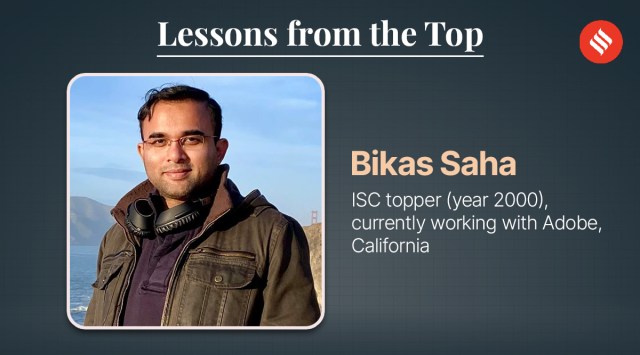Beyond the Board Result: ISC year 2000 topper Bikas Saha on value of networks and dealing with failure
“Our school education could do a lot to prepare us for the practicalities of life. Specific education around financial skills, for example, could help young people take responsible steps into adulthood,” says Saha.
 Bikas Saha (41) topped the Class 12 ISC Board exam with 97.75% in the year 2000. He then studied at IIT Roorkee.
Bikas Saha (41) topped the Class 12 ISC Board exam with 97.75% in the year 2000. He then studied at IIT Roorkee. (In our new series ‘Lessons from the Top’, which we are starting in the run-up to the CBSE and ISC results expected next month, we will feature interviews with four toppers who graduated from high school a decade ago. Among them, one currently works as a scientist at Amazon in the US, another is a principal architect at Adobe in California, the third is a student at Harvard Law School, and the fourth is serving as an IAS officer and SDM of Prayagraj district in Uttar Pradesh. Over the next month, they will share insights into their experiences with schooling, work, personal journeys, and life so far. You can find the rest of the articles here.)
Bikas Saha (41) topped the Class 12 ISC Board exam with 97.75 per cent in the year 2000. He was a student of St James School, Kolkata, at that time. He went on to get a Bachelor’s and Master’s degree in computer science engineering from IIT Kharagpur. Saha is a senior principal architect at Adobe in California, USA.
Q. What’s the best thing about your work?
We currently live in a world of big data. We constantly collect data about everything that is happening around us. Analysing this data has created many opportunities to improve our lives. Most of my work experience is around building large-scale distributed data processing systems. At present, I lead the data governance efforts at the Adobe experience platform, where we focus on supporting the collection and analysis of consumer data while maintaining strong privacy controls and regulatory compliance. This work has a positive impact on protecting the usage of consumer data. I am thrilled to contribute to it, especially in the current climate of urgency in this critical area.
Q. What are the habits from school or college life that have stood you in good stead?
We learn many things during our studies. However, they fade away over time because we don’t use them. The important thing that stands by us is the ability to learn and understand. The curriculum is fixed and that can sometimes help in passing exams by rote learning. The skills obtained after the many years we spend during our education to try to understand subjects and master them will stay with us for life. Our schools and colleges also provide safe and accessible means of collaborating with others for various activities and projects. We should take advantage of these opportunities to learn about working in teams. It is also important to deliver results collectively as we will spend most of our lives working that way.
Q. In hindsight, what is that one thing you wish you had done differently in school or college or life?
This one is easy. I wish I had spent more time on sports and other physical activities during my school and college years. Personal health is the most important asset we have. If we are not healthy and fit, we will not be able to enjoy the bounties of our world, no matter what else we might have. Unfortunately, most people ignore this till it’s too late. Investing even a little bit of time and effort in our health is the best investment we can make.
Q. What are the two things that helped you top the ISC Board exam?
Board exams measure a breadth of knowledge across many basic subjects. While we might be interested in different career paths, it’s really important to have a good understanding of all these basic subjects because eventually that contributes to what overall becomes part of our common sense to deal with the world. I was also fortunate to have good teachers at school who helped set us up for success with their excellent teaching.
Q. What kind doors opened for you after being a national ranker?
While this might not lead directly to any specific opening, except perhaps admissions to top colleges, it serves as a stepping stone in a series of steps that help one climb the ladder. Good educational background helps a student enter top colleges, which, in turn, opens up their own opportunities. And in each of these steps, what matters a lot is the people we connect with and the network we become part of. Openings in life are often a function of the networks of people we are part of.
Q. How different are you from the young boy or girl who topped the exam several years ago? Tell us how you have changed…
Change is part of life. Everything that happens changes us. In some ways, we are the sum total of our individual experiences. The big difference between school years and later is this: things are not set up for us to succeed. School is a protected environment where the parameters of success are well understood, and with effort, everyone can succeed. After education, when we enter the realm of real life, we almost always have to deal with unknowns. Not everyone is rooting for our success. These can sometimes lead to failures. Often these are our first real encounters with failures that matter. Dealing with those failures has added a lot of learnings, empathy and, most importantly, humility to my life.
Q. Looking back at your school education, with the benefit of hindsight, what is the one thing you think should change or improve?
I think our school education could do a lot to prepare us for the practicalities of life. For example, specific education around financial skills could help young people take responsible steps into adulthood. Similarly, more attention to soft skills like social interaction and communication would help students gain a firmer footing when they leave the sheltered space of their homes and schools and enter the real world.
- 01
- 02
- 03
- 04
- 05































